Artificial intelligence (AI) has found its way into every part of the sales process, and we’re not just talking about using ChatGPT to write pitches.
When used creatively, AI can give teams a real competitive edge, helping them close more deals without stretching headcount or budgets. The most successful sales teams are using AI strategically across their workflows, from personalizing outreach to auto-summarizing meetings and streamlining handoffs.
In this article, we’ll explore some of the most impactful ways AI is transforming sales and how AI-powered platforms like monday CRM make it easier than ever to integrate these tools into everyday workflows.
Try monday CRMManual vs AI-assisted sales processes: How have things changed?
Before we get into the different ways AI is being used in sales processes, it’s helpful to get a breakdown of how traditional sales processes have changed with AI. The table below illustrates how AI impacts every stage of the sales cycle, fundamentally changing how sales teams operate. Have a look to get a better understanding of what has changed and keep reading to discover exactly how to get the most out of using AI for sales.
| Sales activity | Manual process | AI-assisted process |
|---|---|---|
| Lead generation | Research prospects, compile lists from various sources, cold outreach without targeting | AI scans databases and social platforms to identify qualified prospects, auto-enriches contact data, scores leads by conversion likelihood |
| Email outreach | Write individual emails from scratch, basic templates with minimal personalization | Generate personalized emails in seconds based on prospect data, industry, and deal stage with tailored messaging |
| Meeting follow-ups | Take handwritten or typed notes, summarize key points, create action items from memory | Auto-transcribe and summarize meetings, extract action items, generate structured follow-up reports |
| Lead qualification | Review each lead, research company background, assign based on basic criteria | Instantly analyze and score leads, auto-route to appropriate reps based on territory, priority, and fit |
| Sales forecasting | Use spreadsheets, historical averages, and gut instincts for revenue predictions | Analyze historical data, pipeline activity, and market trends to generate accurate forecasts in real-time |
| Sales content creation | Write proposals, quotes, and sales materials for each prospect | Generate personalized sales documents, quotes, and presentations using CRM data and AI templates |
| Pipeline management | Track deal progress by hand, remember next steps, update CRM fields individually | AI suggests next best actions, auto-updates deal status, prioritizes opportunities by conversion probability |
| Customer handoffs | Verbally brief new team members, share fragmented notes and email threads | Generate comprehensive deal summaries with interaction history, objections, and context for seamless transitions |
| Call preparation | Research prospect, review previous interactions, prepare talking points from memory | AI provides prospect insights, conversation history, and suggests optimal talking points before each call |
12 ways to use AI in your sales workflows
AI has evolved from a sales trend into a practical powerhouse, particularly for B2B sales teams. According to research by McKinsey, automation and AI can help free up about 20% of a sales team’s capacity. With all that extra time, sales teams can work towards exceeding quotas, building more solid customer relationships, and nurturing every lead. Below, we’ll look at how to use AI in B2B sales with 12 practical ways to apply it to your sales workflows.
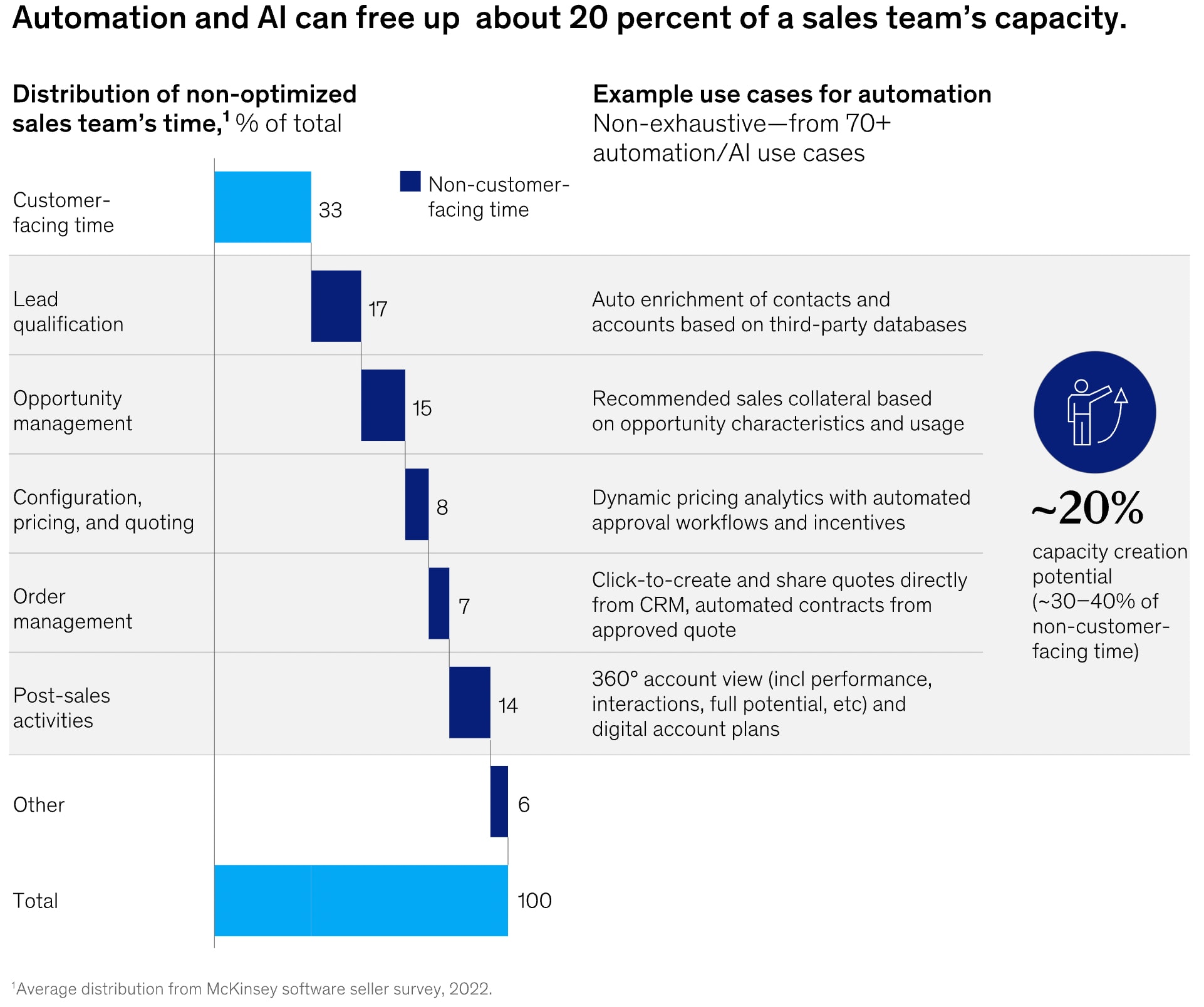
1. Draft personalized outreach emails in seconds
Writing personalized messages at scale is one of the most time-consuming parts of sales, yet personalization is key. According to McKinsey, personalizing sales and marketing experiences leads to an improvement of 15-30% in revenue and retention. AI can generate tailored emails based on deal stage, customer profile, and previous interactions so that reps can engage prospects without spending hours writing dozens or even hundreds of messages from scratch.
For example, a rep following up on a lead could use AI to personalize an email that references a lead’s industry, adjust the tone for a C-suite audience, and insert a call-to-action to schedule a product demo. When using a platform like monday CRM with built-in AI writing assistance, reps can edit and send email drafts directly from the CRM without switching tools.
2. Auto-summarize meetings and follow-ups
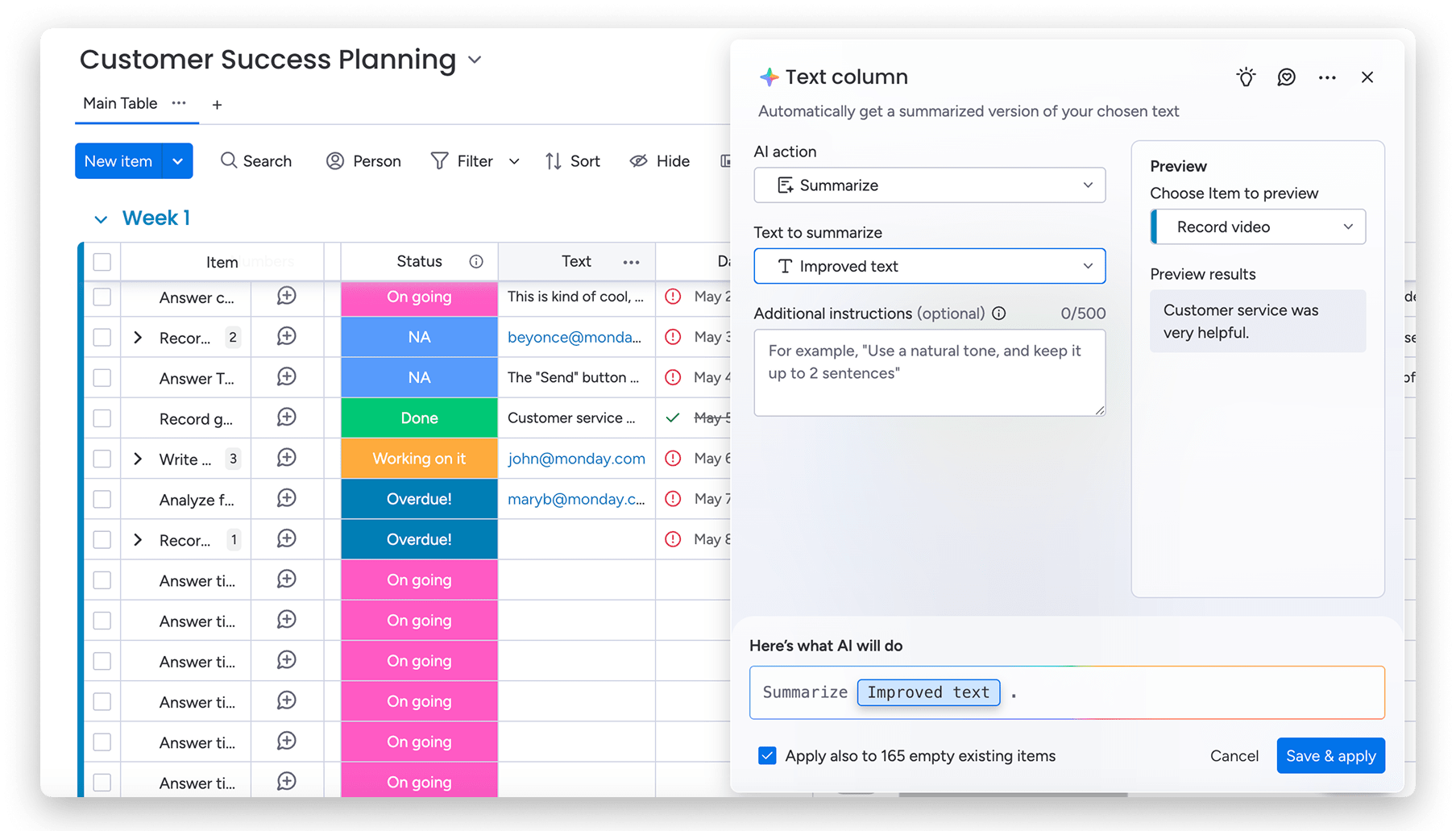
After a long sales call, it’s easy to forget key details or delay next steps while scrambling to take notes. AI can instantly analyze call transcripts, email threads, or meetings and generate structured summaries with action items.
With AI-generated summarization, sales reps can quickly review key takeaways, decisions, action items, and understand next steps without digging through lengthy conversations. Then, reps can share key talking points with stakeholders without rewatching the call or scanning lengthy threads. AI summarization capabilities are embedded in the monday CRM platform so that the entire team stays synced.
3. Generate sales quotes and invoices on demand
When a deal progresses quickly, reps don’t want to lose momentum by formatting a quote or building invoices from scratch. AI can automatically create professional sales documents using details already in your CRM, like pricing and client info.
For instance, if a deal record includes a selected product tier, timeline, and company name, AI can instantly generate a branded quote with pre-filled values and suggested payment terms. With just a click, the rep can send it to the client and keep the deal moving. Teams that use monday CRM can generate these documents with built-in AI tools so that they don’t need to fiddle with manually formatting invoices and quotes.
4. Route and enrich incoming leads
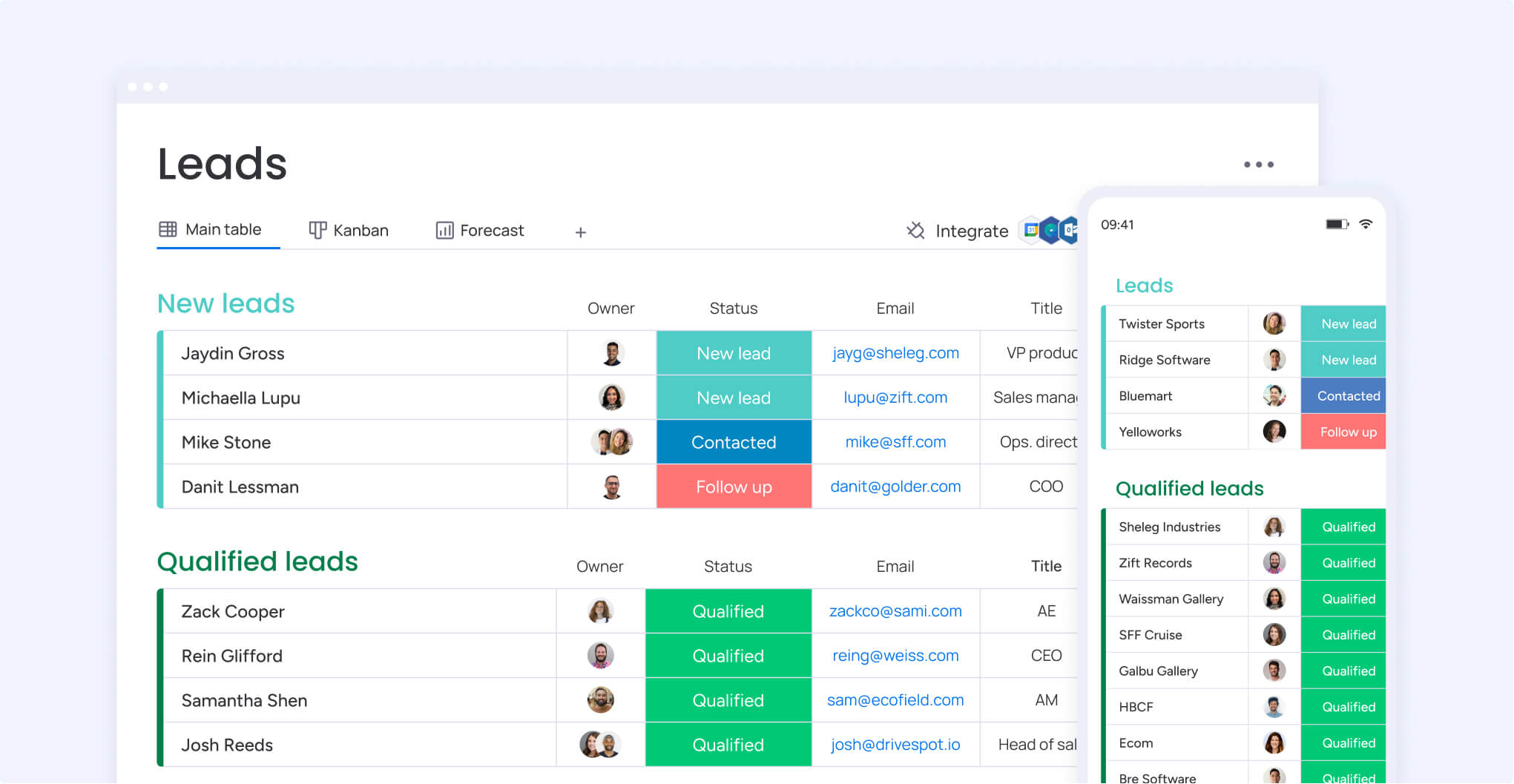
New leads often come in with incomplete information or get stuck in the wrong pipeline. AI can make lead management easier by filling in the blanks, like company size, industry, or contact role, and route leads to the right team member based on priority or territory.
If a new contact completes a web form with just a name and email, AI-powered lead enrichment software can update that record with additional data like LinkedIn profile and firmographics. Then, the lead gets assigned to the right sales rep based on custom parameters, like skill level, territory, or availability, all without any manual work.
5. Suggest the next best action for every deal
Sometimes, reps have dozens of active deals, which makes it tricky to know exactly what to prioritize. AI can analyze historical deal patterns, past communication, and customer behavior to recommend next steps tailored to each opportunity.
For example, if a deal has been idle for 10 or more days, AI might suggest re-engaging the prospect by sending them a case study or nudging with a pricing incentive based on similar won deals. If you’re using monday CRM, built-in AI agents are ready to give you these nudges right in the platform by suggesting next steps or drafting emails to re-engage leads.
6. Create custom sales content for any stage
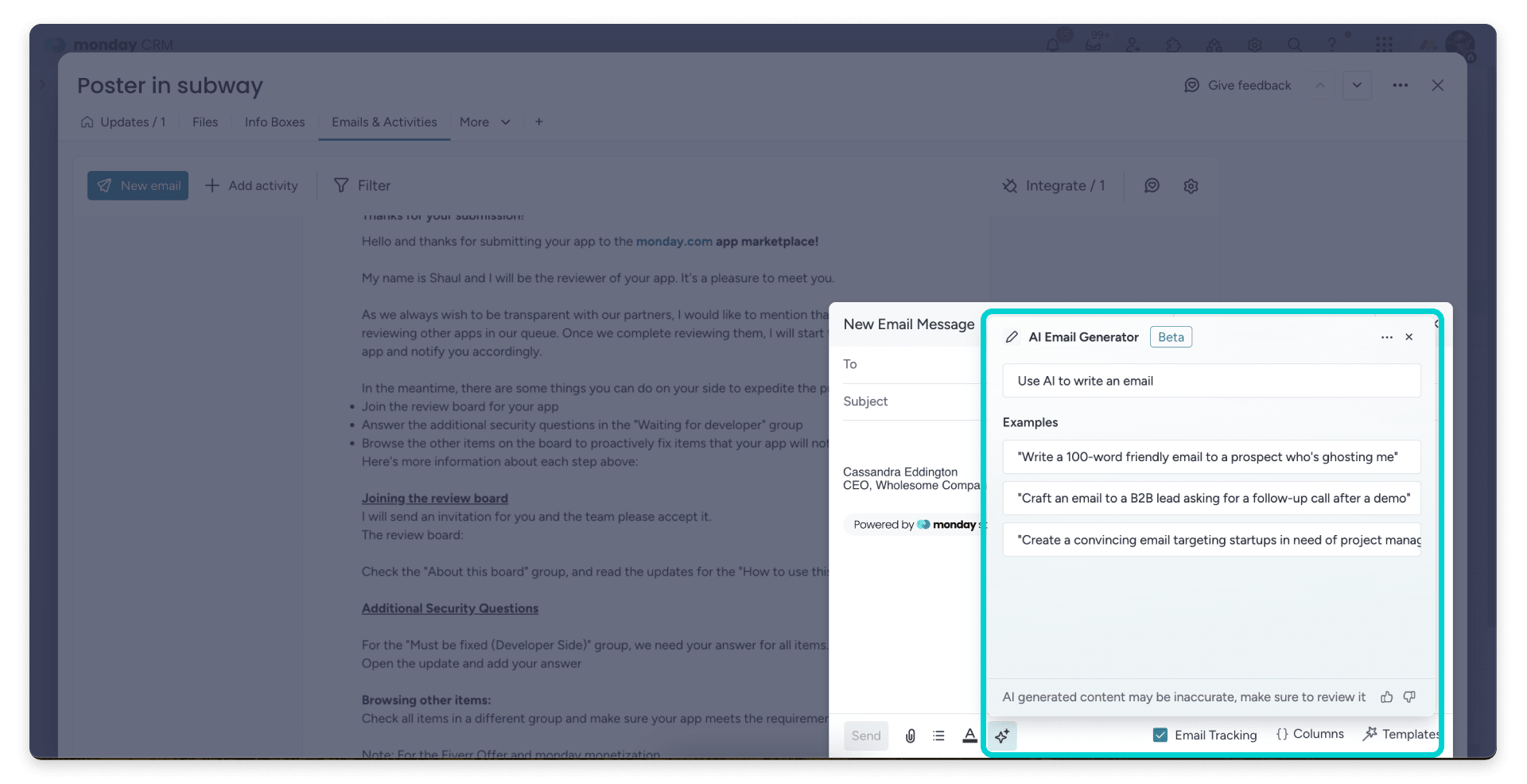
Whether it’s a sales deck, product summary, or follow-up email, reps need content that matches the buyer’s context. AI makes it easier to generate or repurpose assets without reinventing the wheel every time. Sales teams can prompt AI to generate personalized pitch content for specific personas, industries, or stages of the funnel and even convert longer assets into social posts or one-pagers.
Personalizing content with AI can drastically improve the customer experience since prospects receive messaging that directly addresses their specific pain points, industry challenges, and business goals rather than generic, one-size-fits-all materials. With monday CRM, these assets can be created and stored right within each deal so that the entire team has access to them.
7. Fill in CRM fields faster with AI
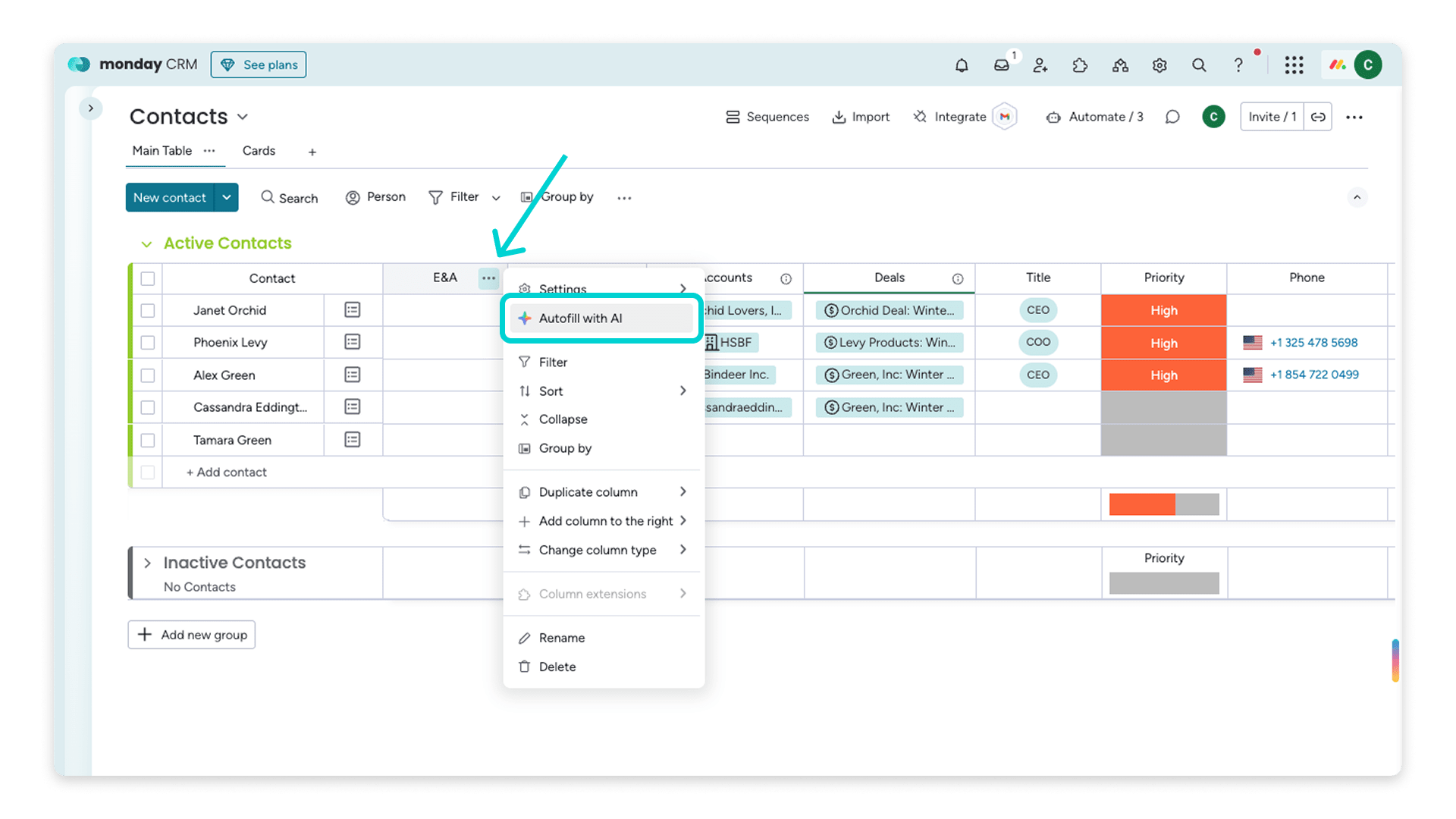
Sales reps often spend valuable time logging notes, summarizing meetings, or adding deal context to CRM fields. Reps can use a CRM with AI to analyze communication history and generate relevant inputs automatically.
A sales agent could ask AI to summarize a discovery call and generate a one-line description for the deal card, add follow-up tasks, highlight important dates, and auto-tag the opportunity based on the customer’s expressed pain points. It can also extract key details like budget ranges, decision timelines, and stakeholder names mentioned during conversations, automatically populating CRM fields without manual data entry.
8. Recap entire deal timelines in one click
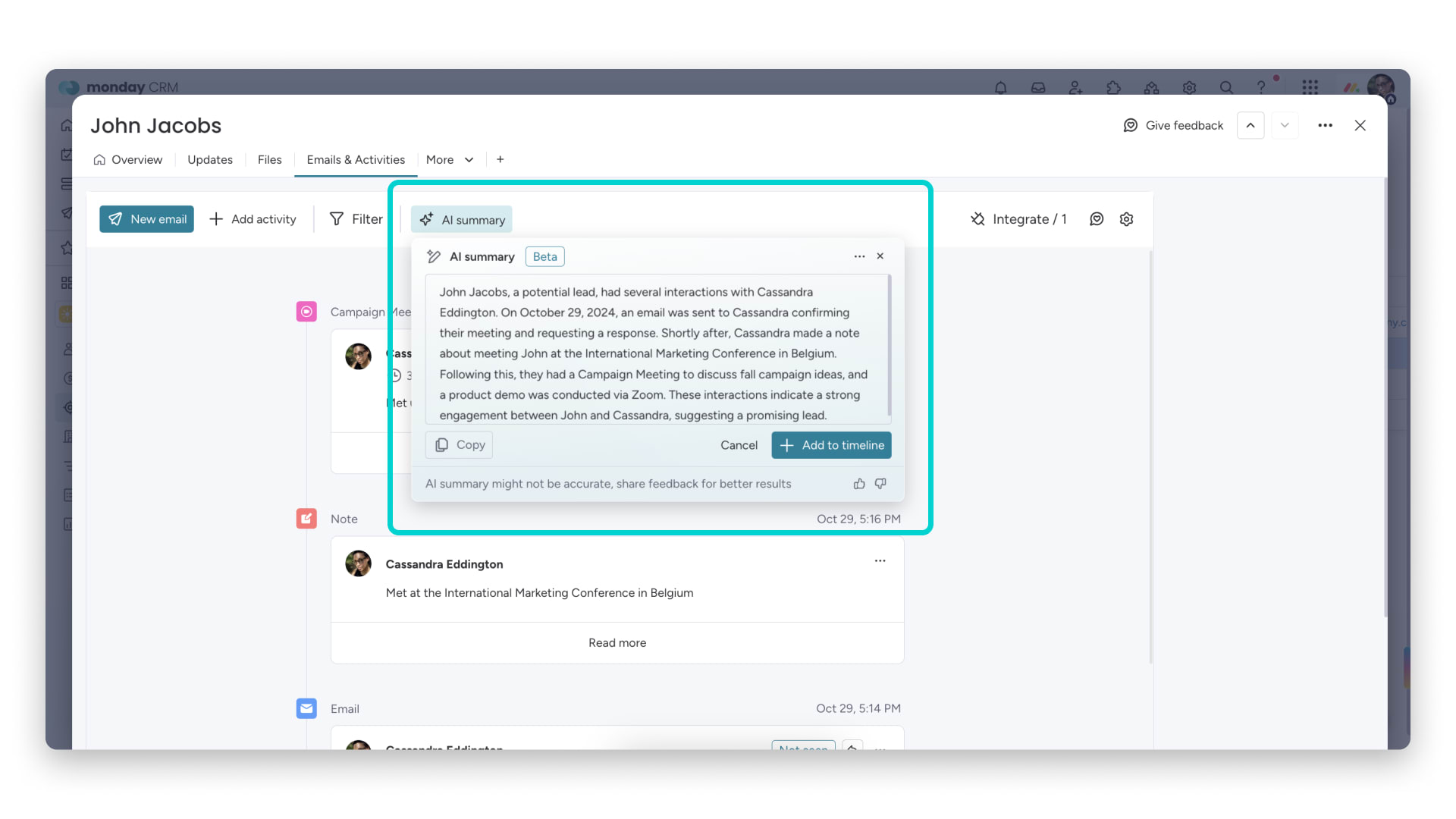
Jumping back into a deal after weeks away? AI can generate a high-level timeline summary so reps can review what’s happened and pick up exactly where they left off. AI timeline summaries also make collaboration a lot easier between reps, as anyone can click on a deal and get up to speed without reading through dozens of emails and call logs.
These summaries synthesize activities, communications, and status updates into a concise, chronological view embedded within the deal board, helping reps and managers stay in sync. With the AI Timeline Summary in monday CRM, reps can visualize AI-generated summaries that eliminate the need to manually dig through status updates.
9. Prioritize leads with intelligent scoring
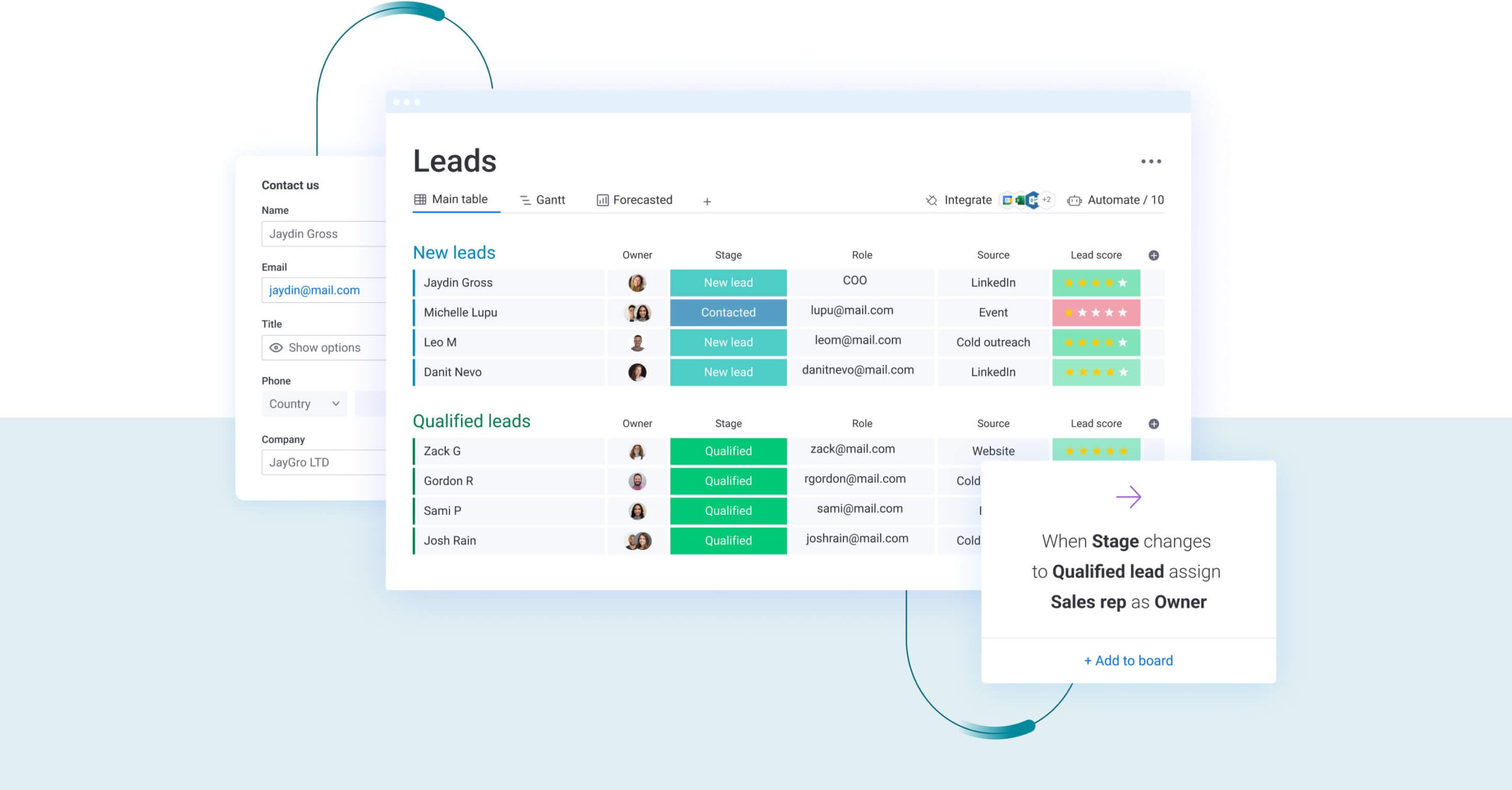
Not all leads are created equal. AI can assess historical conversion rates, engagement behavior, and company data to score leads based on their likelihood to convert.
If you’re wondering how to use AI in B2B sales specifically, this is one of the most impactful applications. In B2B, where deals are complex and sales cycles are long, AI-powered lead scoring helps teams focus on the right opportunities at the right time. For example, a lead who opens multiple emails, visits your pricing page, and shares traits with previously closed deals would automatically rise to the top of the queue.
With monday CRM, users can integrate this logic directly into their lead boards using AI-assisted workflows and scoring rules — no spreadsheet wrangling required.
10. Save time with meeting recaps and sentiment analysis
Instead of rewatching a call or reading through notes, reps can rely on AI to deliver a clean, structured meeting recap. These summaries capture key points, objections, decisions, and agreed-upon next steps.
Once generated, the recap can be added to the deal, shared with managers, or used to trigger automated follow-up workflows. AI can also identify sentiment changes throughout meetings and historically in emails and messages, flagging when prospects seem hesitant or excited about certain topics. This allows sales teams to tailor their follow-up approach accordingly, whether that means addressing specific concerns or capitalizing on areas of high interest to accelerate the sale.
11. Turn updates into task lists automatically
A single update often contains multiple next steps, but reps don’t always have time to turn notes into a task list. AI can break down a conversation or meeting summary into specific action items.
Reps can create tasks like “send pricing sheet,” “schedule follow-up call,” or “loop in tech support.” Then, assign tasks automatically to keep the sales motion moving without manual tracking. AI can even set priority levels and due dates to each task based on deal urgency or client requirements mentioned in the conversation.
12. Improve handoffs with smart deal summaries
When ownership of a deal changes from BDR to AE or AE to success, for example, context is everything. AI-generated summaries can provide the full picture, so transitions are seamless. A smart handoff summary might include the last interaction, client objections, pricing discussed, decision-makers involved, and current stage, all delivered in one clean update.
AI can also highlight a prospect’s communication preferences, buying timeline, and any red flags or urgent priorities that emerged in previous conversations. Smart summaries provide context and prevent new sales reps from having to rebuild rapport or ask redundant questions that could frustrate prospects. With a CRM like monday CRM, handoffs are smooth thanks to AI-generated summaries built into the handoff flow.
Try monday CRMOther AI tools that improve sales
We’ve looked at how CRMs make a big difference in sales when paired with AI, but other AI-powered tools can also make a big impact. Here’s a quick overview of some AI tools to consider implementing:
- Chatbots for sales: Engage website visitors 24/7, answer questions, and gather lead data automatically.
- Conversation intelligence platforms: Analyze sales calls and meetings to identify areas for improvement.
- Lead and prospecting software: Use AI to find detailed contact data and build a targeted prospect list.
- Social selling platforms: Identify prospects on social networks and use AI to suggest engagement strategies.
- AI dialers and voice assistants: Optimize call-timing and get real-time script suggestions generated by AI.
- Competitive intelligence software: Track competitor pricing, messages, and market positioning with AI to inform sales strategies.
- Calendar optimization tools: Use AI to optimize scheduling for demos or meetings, so your calendar is organized.
Sell successfully with monday CRM’s AI-powered platform
There are a lot of AI tools for sales on the market, some of which address very specific sales tasks while others use AI to cover a range of workflows. All-encompassing platforms like monday CRM apply AI to nearly every sales process, helping sales teams reach their goals while expending less time, resources, and energy.
Packed with AI sales automation features, monday CRM empowers teams to work smarter by automating essential sales tasks like lead generation and qualification, sales analytics, pipeline management, and more. With an intuitive interface that’s simple to learn, sales teams can use monday CRM to close deals faster and hone in on high-value deals.
Let’s zoom in on some of monday CRM’s best AI features that help sales teams close more deals.
Personalized AI sales assistants
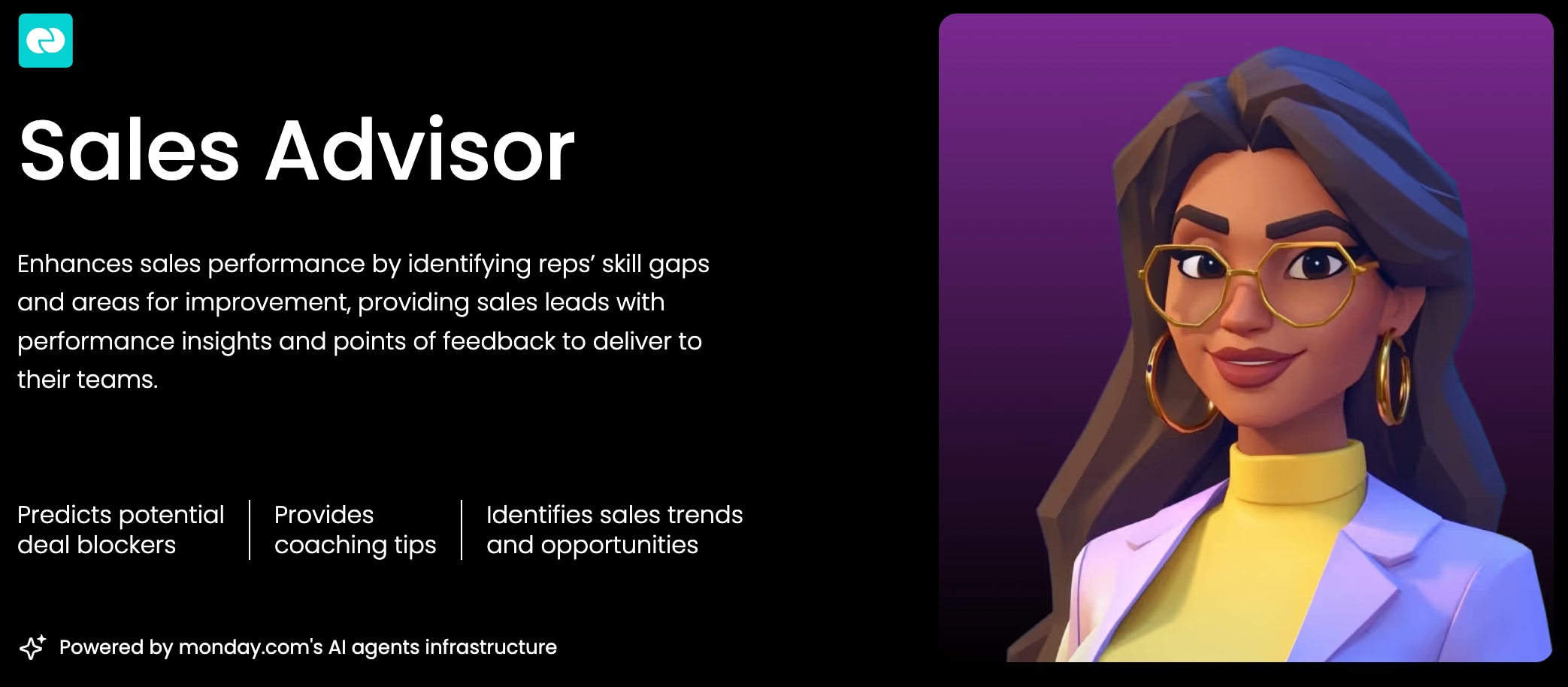
With monday CRM, you can have an entire backup team of AI agents ready to help your team with every aspect of sales. Have an AI sales agent pull up essential content like guides or contracts at the right time, suggest next steps in a client deal, or analyze current pipeline deals to suggest the best course of action.
Generate tailored sales content
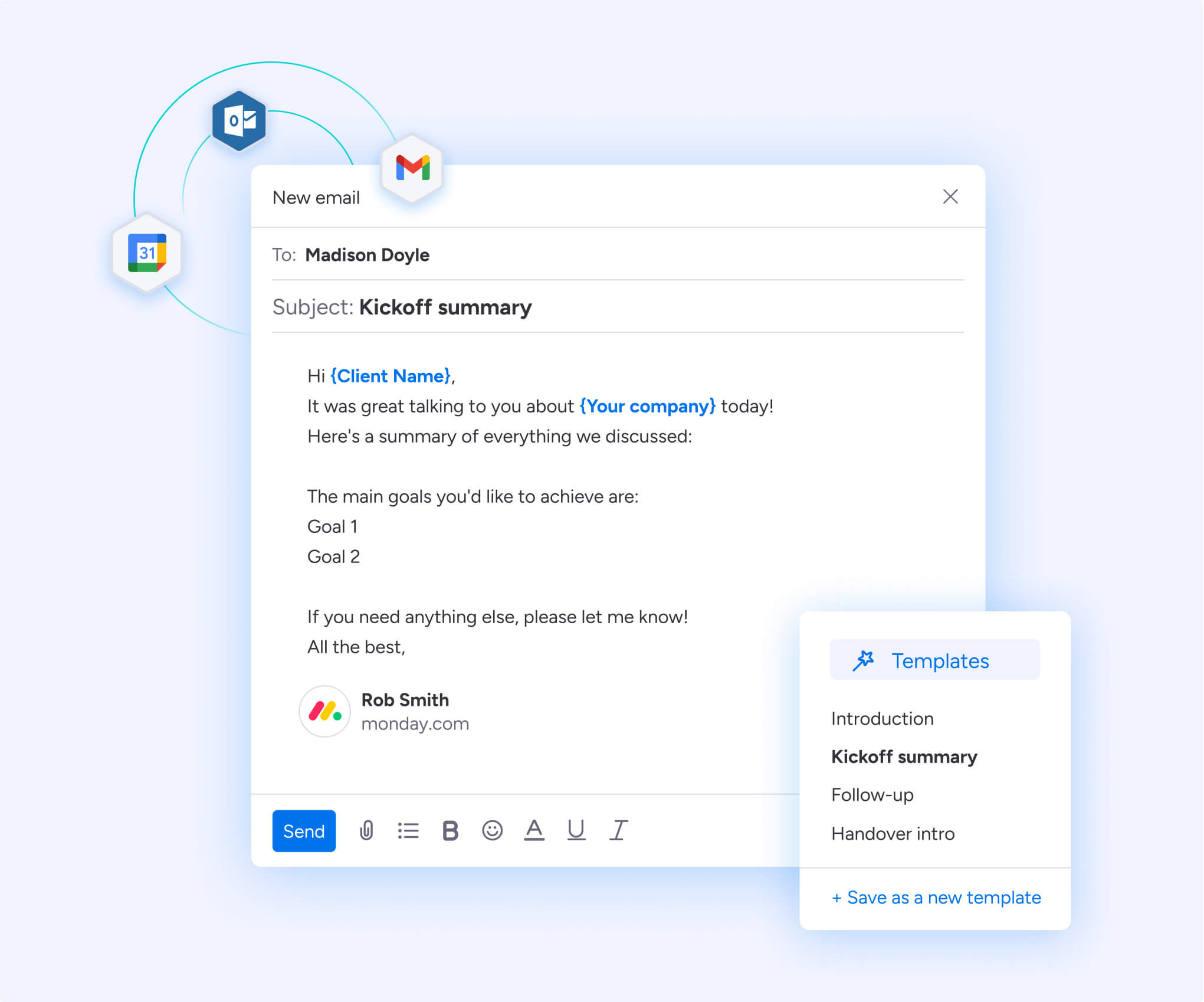
Within monday CRM, there are multiple opportunities for sales agents to leverage generative AI content. Using AI, sales reps can create a sales quote or invoice in a few clicks, personalize an email to strike the right tone, or create a document summarizing customer meetings for stakeholders and managers to review.
Manage and route leads with AI
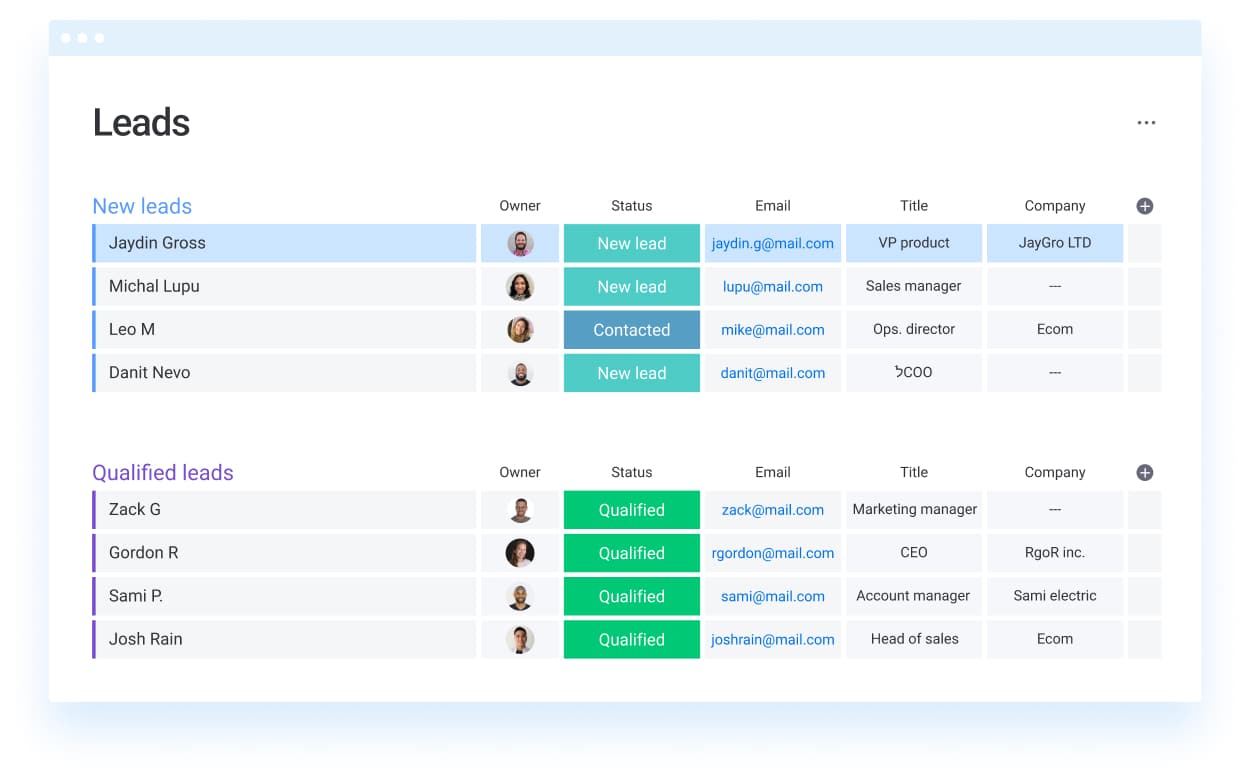
In monday CRM, AI can instantly manage incoming leads by analyzing them, filling in additional data, scoring and ranking them, and then routing each lead to the right agent. This helps save sales teams hours of labor that would otherwise be spent on manual review and organization.
Forecast sales performance with real-time AI insights
Companies that have used monday CRM’s forecasting feature have seen a 75% increase in sales forecasting accuracy and a 92% increase in monthly revenue. Using the data already in your CRM, AI can deliver real-time reports to sales managers so that you’re always up to speed on what’s going on with your sales team, and you can monitor performance and quota attainment without any manual intervention.
Elevate sales performance with AI
Thanks to AI, sales teams can take repetitive tasks off their plates, access high-level data for decision-making, and spend more time nurturing leads and client relationships. Whether to generate leads or personalize messaging, AI is empowering sales teams to work smarter. With AI-powered platforms like monday CRM, all your sales workflows can live harmoniously in one place, making it easier to stay organized, close deals faster, and scale sales efforts.
Want to see it in action? Try monday CRM and start streamlining your sales process with built-in AI tools.
Try monday CRMFAQs
What is the best AI sales tool?
AI sales tools come in all shapes and sizes, from point solutions to fully integrated platforms. For sales teams looking to centralize their work, a tool like monday CRM stands out. Its AI-powered features help automate repetitive tasks, generate personalized content, recommend next steps, and streamline pipeline management — all in one place.
How can you predict sales using AI?
AI can predict sales by analyzing historical performance, live pipeline activity, market trends, and customer behavior. Advanced algorithms generate real-time forecasts, helping teams anticipate revenue, allocate resources, and minimize risk. monday CRM includes built-in forecasting tools that surface actionable insights without manual data wrangling.
Can AI generate sales leads?
Yes! AI can generate and qualify leads by scanning databases, social media, website activity, and third-party sources. It can also enrich lead records, score them based on fit and intent, and route them to the right reps. This helps sales teams focus on the most promising opportunities instead of spending hours on manual prospecting.
Can AI build a sales funnel?
AI can help teams build and manage a sales funnel by automating lead qualification, guiding customer journeys with personalized content, and tracking progress through each stage. AI tools also detect bottlenecks, suggest next steps, and keep the funnel updated in real time, making the entire sales process efficient and scalable.
Can I use AI to make sales calls?
Yes, AI can handle initial sales calls through voice bots and automated dialers that qualify prospects, gather basic information, and schedule follow-up meetings. However, AI works best for early-stage, high-volume outreach rather than complex sales conversations. Most successful implementations use AI to handle initial contact and qualification, then transfer promising leads to human sales reps for relationship building and closing.
Is AI replacing sales reps?
AI isn’t replacing sales reps, but it is augmenting how they work. Although AI handles tasks like data analysis, lead scoring, and scheduling, human reps are still critical for building relationships and navigating complex deals. The most effective teams use AI to free up reps for more strategic, high-impact selling.

